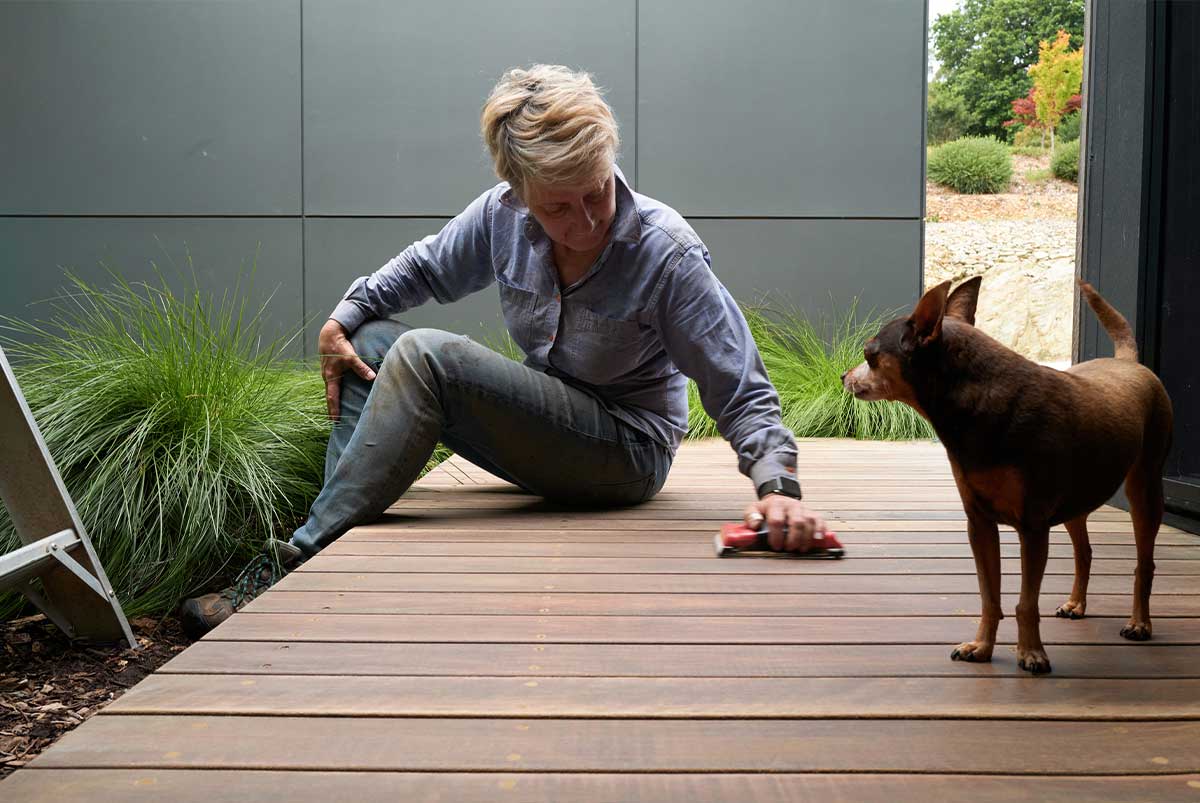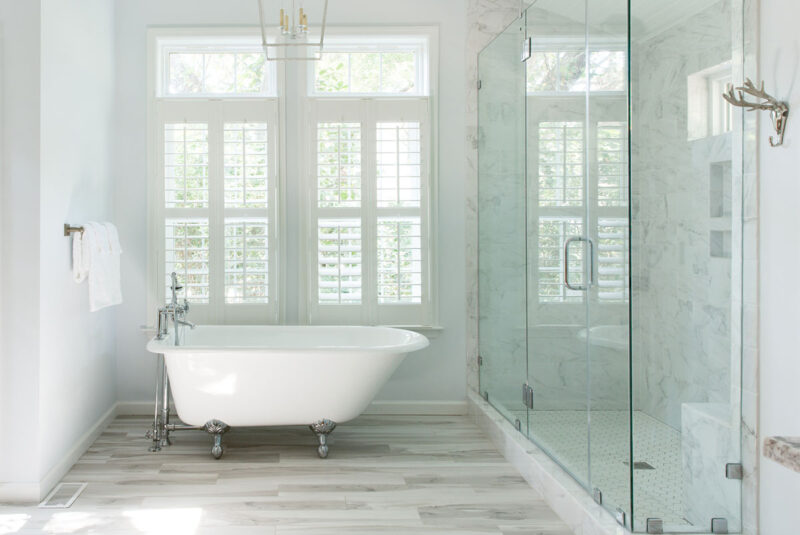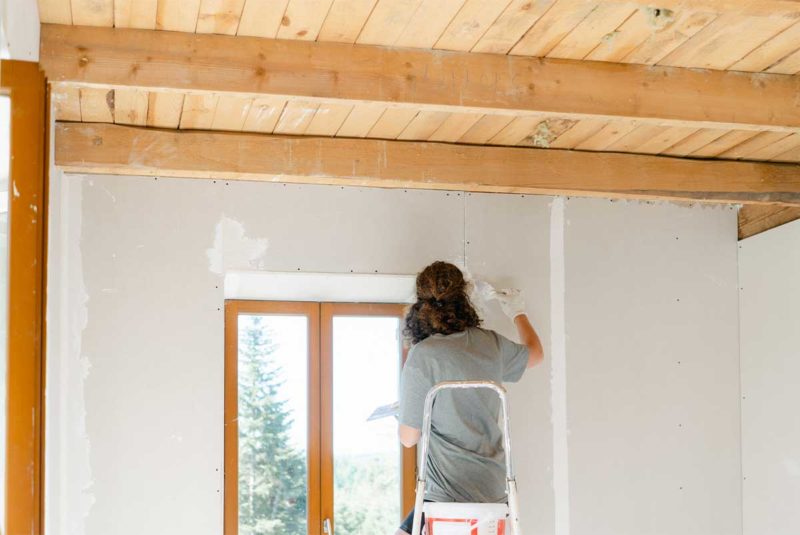Ready To Buy a Home?
Get Approved to Buy a Home
Rocket Mortgage® lets you get to house hunting sooner.
A deck is one of those home improvements that keeps on giving. While you’re living in your home, it expands your living space and makes it more comfortable to enjoy the great outdoors. When you’re ready to sell, a deck can increase your home’s property value and bring in a bigger profit.
If you’re thinking about building a deck, you’re not alone. In 2020, deck construction surged as homeowners raced to improve their living spaces. This spike in demand – coupled with pandemic-related supply chain disruptions – created a steep increase in decking prices.
The average deck usually costs between $4,000 and $12,000, or $30 – $60 per square foot,[1] but the price you pay may be considerably higher or lower.
Different factors will affect the total cost of a deck. We can help you set a realistic budget before you head to the hardware store or start calling contractors.
How Do I Estimate the Cost of a New Deck?
The final price of a deck can vary based on materials, size, design and labor.
Deck Material
Decking material will have the biggest impact on a deck’s final cost. So, when you’re creating a deck budget, think carefully about the material you choose. Most homeowners choose one of three popular materials to build a deck: wood, composite or plastic/vinyl.
- Wood: Wood is beautiful, sturdy and easy to work with, but it requires regular maintenance and has a tendency to warp and split. Its price tag will depend on the type of wood you choose, but pricing usually ranges from $2 – $30 per square foot.[2] Pressure-treated wood is the cheapest. Exotic hardwood is typically the most expensive.
- Composite: Composite decking, which looks like wood, is made from a mix of recycled plastic and wood fibers. It’s exceptionally durable, easy to clean and requires minimal maintenance. This environmentally friendly composite material usually costs $12 – $22 per square foot.[2]
- Plastic/vinyl: This type of decking is made entirely of synthetic materials and costs $5 – $13 per square foot.[3] The material can be difficult to install and sometimes it looks more like plastic than wood.
Size
Size plays a big part in a new deck’s overall cost. It affects both decking material and labor costs. That’s why builders usually quote the price per square foot.
The bigger the deck, the more money you’ll spend.
That doesn’t mean a tiny deck is the best choice. Look for a happy medium between usability and cost and design.
You may decide you want a deck that’s no more than 20% of the house’s square footage, or you may decide to go bigger. A general guideline is to allow an average of 20 square feet of space per person.
The size of your yard can also limit the size of your deck. The building codes in your area may be another limiting factor. Depending on where you live, the rule may be that the edges of the deck are at least 3 feet away from the property line.
So, how exactly does size impact price? Here’s a quick estimate of what different deck sizes might cost, assuming a cost of $25 – $60 per square foot (including decking material and labor):
| Deck Size | Square Footage | Approximate Deck Cost |
| 4 x 15 | 60 | $1,500 – $3,600 |
| 8 x 10 | 80 | $2,000 – $4,800 |
| 12 x 8 | 96 | $2,400 – $5,760 |
| 10 x 10 | 100 | $2,500 – $6,000 |
| 12 x 12 | 144 | $3,600 – $8,640 |
| 12 x 16 | 192 | $4,800 – $11,520 |
| 12 x 18 | 216 | $5,400 – $12,960 |
| 12 x 20 | 240 | $6,000 – $14,400 |
| 16 x 16 | 256 | $6,400 – $15,360 |
| 14 x 20 | 280 | $7,000 – $16,800 |
| 20 x 20 | 400 | $10,000 – $24,000 |
| 15 x 30 | 450 | $11,250 – $27,000 |
As you can see, even a few feet can make a big difference in price. And when you’re working with a contractor, you may need to factor in the cost of deck plans.
Design
If you want to add unique features to your deck, like stairs or a custom railing, expect higher building costs. Complicated designs require careful engineering, additional labor and special decking material.
Popular design elements can make the cost of a deck jump significantly:
- Multilevel decks
- Built-in seating
- Wraparound designs
- Curved stairs
- Special railings
- Integrated lighting
Are you thinking of installing a hot tub on your deck? You’ll need thicker framing boards, sturdier concrete reinforcements and additional supports to hold the weight.
While it’s true that these features are more expensive, they can also increase the value of your home. As you design the deck, look at nearby properties to see which features are most popular.
Labor
When you’re estimating the price of a deck, labor costs are a key variable. And when it comes to labor, you’ve got two main options: hire a professional contractor or do it yourself.
The DIY approach may help you save money, especially if you know what you’re doing and you can recruit a few extra pairs of hands. But it’s not always cheaper to build your own deck. Contractors are generally faster, more efficient and less likely to make costly mistakes.
Contractor rates can vary based on demand, the time of year and your location. Companies will charge differently for labor, so it could be well worth your time to shop around.
When you’re hiring a contractor for a deck installation, keep these tips in mind:
- Get 3 – 5 quotes to figure out the average price
- Review photos of past deck installations
- Talk to former clients
- Read credible online reviews
- Keep an eye out for a pattern of complaints about build quality, timeliness and materials
- Check the contractor’s license
- Verify that the contractor is bonded and insured
- Request site visits before you decide on a contractor
Should I Build My Own Deck or Hire a Pro?
How do you decide between building a deck on your own or hiring a contractor? Well, neither approach is objectively better. But there are pros and cons to each approach. Before you make any decisions, try to imagine how each scenario might play out in the long term.
If you’ve got the know-how to install a deck, the DIY route has obvious benefits: It can reduce the cost of construction by up to 50%,[1] and you won’t have to wait until a pro is available to work on your project. BTW, that’s not a small consideration. Reputable contractors are often booked months in advance.
This would be the time to honestly and critically evaluate your experience and abilities. A deck is a complicated project. If something goes wrong, you may put yourself and others at risk. You may open yourself up to legal liability, and you may drastically inflate the final cost of the deck.
Let’s take the price out of the picture and consider other factors that should affect your decision.
- Permit: Contractors can typically secure permits and licenses faster than you could on your own. And because they’re familiar with local building codes, they’re more likely to spot potential issues with property lines, septic fields and other structures.
- Safety: Decks are inherently risky, especially if they’re elevated. If someone gets hurt because of a loose board, a collapsing foundation, an unstable deck railing or uneven stairs, you’re liable. This is where experienced contractors have the advantage. They have the training, experience and skill to build safe, sturdy decks that stand up to weather, foot traffic and ground movements.
- Design: The average DIY builder can usually tackle a simple square or rectangular design, but if you want something more complicated, a contractor is the better choice. They have the engineering skills and design software to safely bring your vision to life.
How Can I Save Money When I’m Building a Deck?
The variables can feel overwhelming, but there’s good news. The variables can also create lots of pricing flexibility. After all, you control the size, the design and the material.
There are plenty of ways to keep your costs in check:
- Budget: Develop a budget you won’t diverge from. Whether you build the deck yourself or hire a pro, your budget should guide every decision and help prevent overspending.
- Shop around: Talk to multiple contractors and vendors to make sure you’re getting the best prices you can find.
- Go smaller: A slightly smaller deck can save you hundreds or thousands of dollars.
- Research legal requirements: Find out what permits your city requires for decks and look into zoning restrictions. Check how far the deck needs to be from the property line and other buildings. Doing your research can help you avoid expensive fines later on.
- DIY teardown: You can save money on labor by tearing down an existing deck on your own. Demolition doesn’t usually require any special expertise, but you should have some basic skills and follow safety measures.
- Choose inexpensive wood decking: A treated wood deck is a fraction of the price of a plastic or composite deck. Make sure to factor in the recurring costs of sealing and repainting.
- Consider board lengths: A design that uses standard board lengths requires fewer cuts, so you’ll spend less on labor and materials.
- Streamline the design: Eliminate curves and ditch the fancy railing or intricate structures to save money. And here’s another money-saving tip: It’s cheaper to build a freestanding deck rather than one that’s built out from your home.
- Consider a hybrid approach: Cut labor costs by hiring a contractor to build the structure, and you handle the finishing on your own.
- Look for specials: Follow local contractors and home supply stores on social media to learn about sales and offseason deals.
The Deck of Your Dreams Doesn’t Have To Break the Bank
A deck can expand your living space and increase your property value – if it’s done well. When you understand what goes into the price of building a deck, it’s easier to control costs and stay within your budget.
Strapped for cash?
Your home’s equity is your money. So whether it’s for a new kitchen or consolidating debt, a cash-out refinance can help get you there.
The Short Version
- The average deck usually costs between $4,000 and $12,000, or $30 – $60 per square foot
- The final price of a deck can vary based on materials, size, design and labor
- Most homeowners choose one of three popular materials to build a deck: wood, composite or plastic/vinyl
Home Advisor. “How Much Does It Cost To Build A Deck?” Retrieved April 2022 from https://www.homeadvisor.com/cost/outdoor-living/build-a-deck/
Home Advisor. “Decking Price Guide.” Retrieved April 2022 from https://www.homeadvisor.com/cost/decks-and-porches/#decking-boards-prices-pressure-treated-pine
Home Advisor. “How Much Does PVC Vinyl or Composite Decking Cost?” Retrieved April 2022 from https://www.homeadvisor.com/cost/outdoor-living/composite-pvc-decking/




